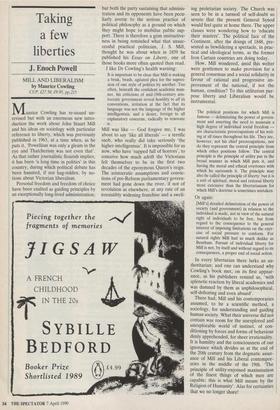Taking a few liberties
J. Enoch Powell
MILL AND LIBERALISM by Maurice Cowling CUP, £27.50, £9.95, pp.215 Maurice Cowling has re-issued un- revised but with an enormous new intro- duction the work about John Stuart Mill and his ideas on sociology with particular reference to liberty, which was previously published in 1963, at a time when, as he puts it, 'Powellism was only a gleam in the eye and Thatcherism was not even that'. As that rather journalistic flourish implies, it has been 'a long time in politics' in this country, during which political debate has been haunted, if not hag-ridden, by no- tions about Victorian liberalism.
Personal freedom and freedom of choice have been exalted as guiding principles by an exceptionally long-lived administration;
but both the party sustaining that adminis- tration and its opponents have been pecu- liarly averse to the serious practice of political philosophy as a ground on which they might hope to mobilise public sup- port. There is therefore a grim instructive- ness in being reminded what that unsuc- cessful practical politician, J. S. Mill, thought he was about when in 1859 he published his Essay on Liberty, one of those books more often quoted than read.
I like Dr Cowling's health warning:
It is important to be clear that Mill is making a brisk, brash, agitated plea for the supres- sion of one style of politics by another. Too often, beneath the confident academic man- ner, his criticisms of mid-19th-century aris- tocratic government reveal hostility to all its conventions, irritation at the fact that its language was not the language of the higher intelligentsia, and a desire, foreign to all explanatory concerns, radically to renovate it.
Mill was like — God forgive me, I was about to say 'like all liberals' — a terrific snob, who really did take seriously 'the higher intelligentsia'. It is impossible for us now, who have 'supped full of horrors', to conceive how much adrift the Victorians felt themselves to be in the first two decades of the eponymous Queen's reign. The aristocratic assumptions and convic- tions of pre-Reform parliamentary govern- ment had gone down the river, if not of revolution as elsewhere, at any rate of an irresistibly widening franchise and a swell- ing proletarian society. The Church was seen to be in a turmoil of self-doubt so severe that the present General Synod would feel quite at home there. The upper classes were wondering how to 'educate their masters'. The political face of the Continent, after the doings of 1848, pre- sented as bewildering a spectacle, in prac- tical and ideological terms, as the former Iron Curtain countries are doing today.
How, Mill wondered, amid this welter were gentlemen to make provision for a general consensus and a social solidarity in favour of rational and progressive im- provement of the national, if not the human, condition? To this utilitarian pur- pose liberty and Liberalism would be instrumental.
The political positions for which Mill is famous — delimitating the power of govern- ment and asserting the need to maintain a high degree of individual social freedom are characteristic preoccupations of his writ- ing at all times throughout his life. They are, however, not his chief preoccupations, nor do they represent the central principle from which other positions follow. The central principle is the principle of utility put in the broad manner in which Mill puts it, and having the moral and ethical overtones with which he surrounds it. The principle may also be called the principle of liberty: but it is a sort of spiritual, moral and rational liberty more extensive than the libertarianism for which Mill's doctrine is sometimes mistaken.
Or again:
[Mill's] detailed delimitation of the power of society (and government) in relation to the individual is made, not in view of the natural right of individuals to be free, but from regard to the consequence to the general interest of imposing limitations on the exer- cise of social pressure to conform. For natural rights Mill had as much dislike as Bentham. Pursuit of individual liberty for Mill is not, by itself and without regard to its consequences, a proper end of social action.
In every libertarian there lurks an au- thoritarian; and one can understand why Cowling's book met, on its first appear- ance, as his publishers remind us, 'with splenetic reaction by liberal academics and was damned by them as unphilosophical, self-defeating and even absurd'.
There had, Mill and his contemporaries assumed, to be a scientific method, a sociology, for understanding and guiding human society. What their universe did not contain was room for the unexplored and unexplorable world of instinct, of con- ditioning by forces and forms of behaviour dimly apprehended, for sheer irrationality. It is humility and the consciousness of our ignorance which divides us at the end of the 20th century from the dogmatic assur- ance of Mill and his Liberal contempor- aries in the middle of the 19th. 'The principle of utility-enjoined maximisation of the finest things of which men are capable; this is what Mill means by the Religion of Humanity'. Alas for certainties that we no longer share!


























































 Previous page
Previous page